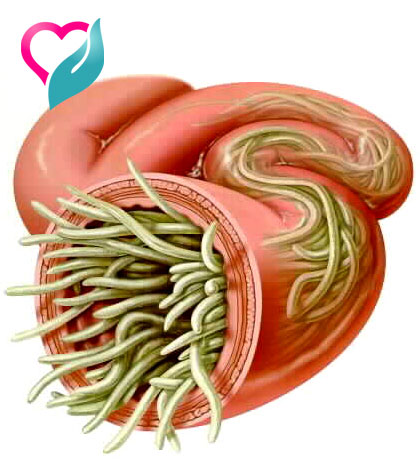Worms inside you?! It sounds like a nightmare, but it is real and it could be happening to you and your children right now. What are these worms and how do they get into our intestines? Let’s take a closer look.
[wp_ad_camp_1]
Intestinal worms are parasites, which thrive in the intestines of another organism. Parasites enter the human body in one of four ways through food and water, through transmitting agents, such as a mosquito and sexual contact and also through nose and skin. Even though there are thousands of parasites that infect humans, only four are very harmful. They are:
- Roundworm (spreads through food and water)
- Pinworm (spreads from person to person)
- Whipworm (spreads through food and water)
- Tapeworm (spreads by eating raw or undercooked meats)
[wp_ad_camp_4]
Causes
Eating contaminated food, dirty fingers, drinking contaminated water, walking bare foot, undercooked flesh foods, foods contaminated by dogs, transmitting agents such as a mosquito, sexual contact, germs that enter through nose and skin, poor sanitation, and using human excretion as fertilizer.
Symptoms
Diarrhea, foul breath, dark circles under the eyes, constant desire for food, restlessness at night with bad dreams, anemia, headaches, inflammation of the intestine and lungs, nausea, vomiting, loss of weight, fever, nervousness, irritability, constipation, cough, intense itching in the area around the rectum, weakness, swelling of facial features, chest pain, sweating, lung congestion, etc.
Prevention
- Always wear shoes outside and remove them before walking inside the home.
- Boil or purify drinking water.
- Regularly de-worm domestic animals and pets.
- Never allow animals onto beds or to lick the face.
- Pay particular attention to food and personal hygiene.
- Wash vegetables and fruit meticulously – soaking vegetables in a bicarbonate of soda and water solution then rinsing can reduce the risk of contamination.
[wp_ad_camp_2]
Home Remedies
For people with pinworm infections, home treatment is very important to prevent reinfection and the spread of infection to other members of the household.
- Wash hands carefully and often. Frequent hand-washing by all family members, especially before eating or preparing food and after using the toilet, is very important in preventing the spread of infection. Hand-washing will help remove eggs that may have stuck to the hands. Scrubbing your hands and fingernails for 1 minute is recommended.
- Control scratching. Itching around the anus caused by a pinworm infection usually occurs at night. Wearing gloves may help prevent scratching.
- Keep fingernails short. Pinworm eggs can get under the fingernails when the person with a pinworm infection scratches.
- Wash clothes and bedding. Washing underwear, pajamas, and bedding and drying them in a heated dryer on the first day of treatment may help prevent reinfection.
- Bathe carefully and every day. Make sure the skin around the anus is cleaned when bathing. This will remove pinworm eggs. Bathing in the morning may help get rid of a lot of the eggs. Showers may work better than baths because there is less chance of getting water that contains pinworm eggs into your mouth.
- Do not fan the bedding of an infected person. Fanning the sheets and blankets of an infected person can put pinworm eggs into the air. Airborne eggs can be swallowed when you breathe through your mouth.
More Measures
Some doctors recommend extra housecleaning, such as frequent mopping and vacuuming and cleaning the toilet seat after each use, to prevent the spread of pinworms, but other doctors do not believe that these measures are very effective.
Carrots are known for treating intestinal worms. Grate 2 pieces of carrot and eat them on an empty stomach in the morning. Doing this daily will not only help get rid of parasites but also prevent parasite attack in the future.
One tablespoon of raw papaya juice mixed with 1 teaspoon of honey to be taken, first thing in the morning. This should be followed by a glass of warm milk, to which 1 teaspoon of castor oil is added. This treatment should be done for 2 days.
A mixture of pomegranate bark and water should be given thrice a day to adults and children suffering from worm infestation. The bark of pomegranate tree contains punicine, which is highly toxic to intestinal worms.
A mixture of ground pumpkin seeds and water can help to expel tapeworms.
Garlic has strong anti-fungal and antiseptic properties. Eating 3 cloves of raw garlic per day can help get rid of all types of intestinal worms.
Wormwood is a powerful herb that has been used since ancient times to treat intestinal worms. Drink a mixture of wormwood oil and olive oil to get rid of worms.
Ground some coconut and store it. Every morning, take a tablespoon of coconut at the breakfast. After three hours, take 30 to 60 ml of castor oil mixed with 250 to 375 ml of lukewarm milk. Repeat the process for a few days.
Papaya leaves are also beneficial in curing intestinal worms. Pour 250 ml of boiling water in a pan containing 15 gm of dry papaya leaves. Take this decoction with honey.
A simple natural remedy would be to have a glass of boiled water with a tablespoon of rock salt. Have this empty stomach every morning.
[wp_ad_camp_3]
Image courtesy: guardianrottweilers.com

























